
Find Help
More Items From Ergsy search
-

What is hay fever?
Relevance: 100%
-

Hay fever advice | NHS
Relevance: 94%
-
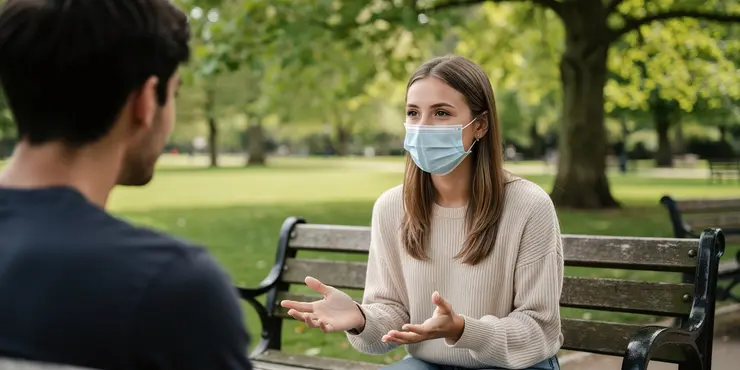
Do masks help with hay fever?
Relevance: 93%
-

Can hay fever be prevented?
Relevance: 93%
-

What are the common symptoms of hay fever?
Relevance: 92%
-
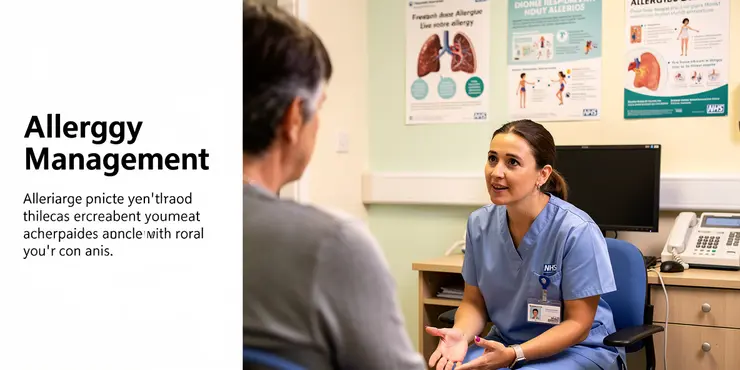
Is there a link between hay fever and asthma?
Relevance: 92%
-
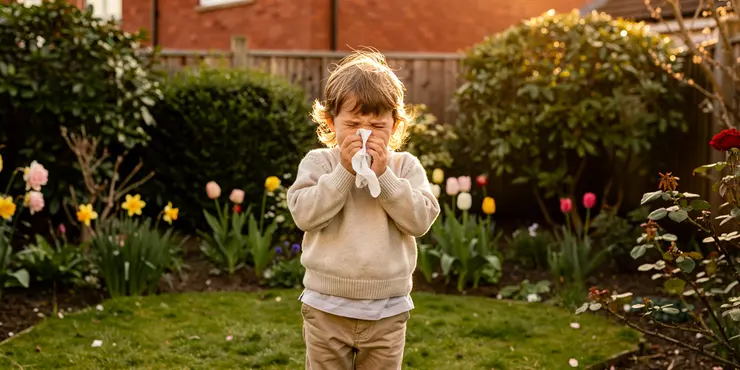
Can children develop hay fever?
Relevance: 91%
-

Can hay fever occur year-round?
Relevance: 90%
-
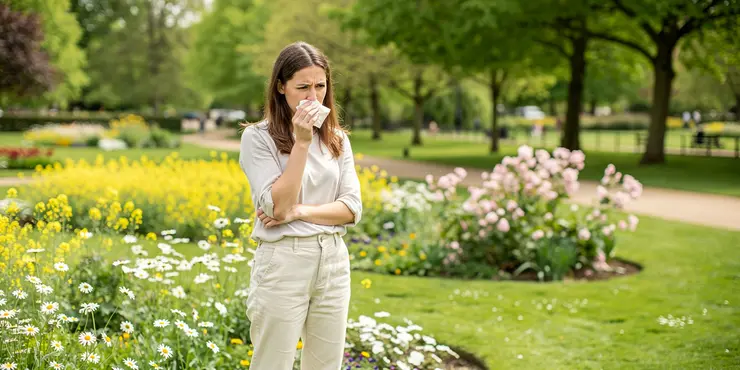
Are some people more prone to hay fever?
Relevance: 89%
-

Do pets contribute to hay fever?
Relevance: 88%
-

Is hay fever more common in urban areas?
Relevance: 88%
-

Can diet influence hay fever symptoms?
Relevance: 88%
-

Antihistamines how they work with hay fever
Relevance: 87%
-

Can hay fever symptoms mimic other conditions?
Relevance: 86%
-

Do all plants produce pollen that causes hay fever?
Relevance: 86%
-
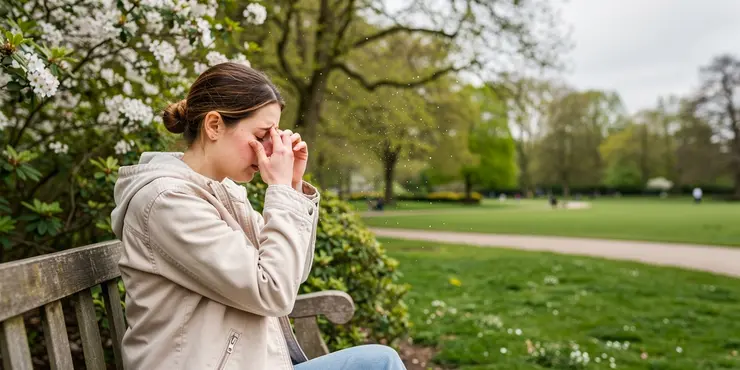
How does pollen affect people with hay fever?
Relevance: 85%
-

Why are experts warning of rising hay fever cases?
Relevance: 85%
-

Self care - hay fever itchy eyes
Relevance: 84%
-
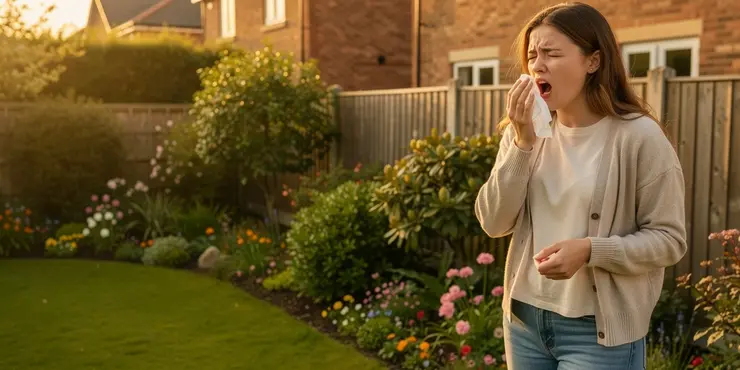
Experts Warn of Rising Hay Fever Cases as Pollen Counts Surge
Relevance: 81%
-

Can mosquito screens help reduce hay fever symptoms?
Relevance: 77%
-

Are there any treatments for hay fever?
Relevance: 68%
-

How long does a typical hay fever season last?
Relevance: 58%
-

Caring for a child with fever | NHS
Relevance: 40%
-

Can dengue fever be contracted in the UK?
Relevance: 39%
-

Is there a risk of yellow fever being spread by mosquitoes in the UK?
Relevance: 39%
-

How to treat glandular fever | NHS
Relevance: 39%
-

Which medication should be avoided for children with fevers?
Relevance: 37%
-

What is Dengue Fever?
Relevance: 33%
-
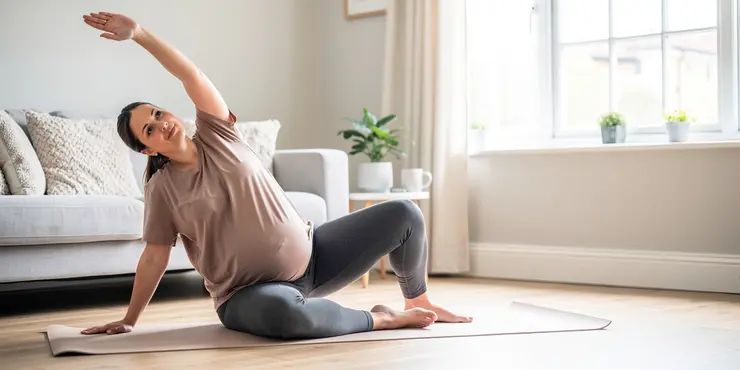
Can lifestyle changes help manage pain and fever during pregnancy?
Relevance: 32%
-
Can Dengue fever be transmitted through blood transfusions?
Relevance: 30%
-

What are some common conditions treated with homeopathy?
Relevance: 18%
-
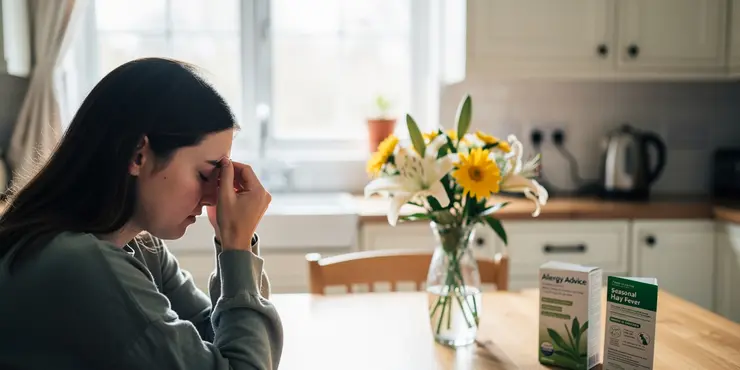
Dealing with Seasonal Allergies
Relevance: 17%
-

Are there safer alternatives to paracetamol for pregnant individuals experiencing pain or fever?
Relevance: 17%
-

Are any vaccines available in the UK for mosquito-borne diseases?
Relevance: 17%
-

Who is at risk of developing eczema?
Relevance: 17%
-

How does climate change affect pollen levels?
Relevance: 16%
-

Advice if your child has... A High temperature
Relevance: 15%
-

What symptoms should I watch for if I suspect a mosquito-borne disease?
Relevance: 14%
-

Are Mosquito window screens effective?
Relevance: 14%
-

What diseases are spread by mosquitos in the UK in 2025?
Relevance: 14%
Can Hay Fever Occur Year-Round?
In the United Kingdom, hay fever is usually associated with spring and summer, coinciding with the release of pollen from flowers, trees, and grasses. However, what many people may not realise is that hay fever can indeed occur year-round, a condition sometimes referred to as perennial allergic rhinitis.
What Causes Year-Round Hay Fever?
Unlike seasonal hay fever, which is triggered by pollen, year-round hay fever is primarily caused by allergens that are present indoors all year long. Common culprits include dust mites, pet dander, mould spores, and cockroach droppings. These allergens can provoke similar symptoms to those experienced during the typical hay fever season, such as sneezing, a runny or blocked nose, and itchy or watery eyes.
Symptoms of Perennial Hay Fever
The symptoms of perennial hay fever can be persistent and sometimes indistinguishable from those of seasonal hay fever. This includes frequent sneezing, nasal congestion, nose itching, and postnasal drip. Some individuals may also experience a reduced sense of smell, ear blockage, and fatigue as a result of prolonged inflammation caused by the allergens present indoors.
Diagnosis and Testing
If you suspect that you are suffering from year-round hay fever, it is advisable to consult with a healthcare professional. They may perform tests to identify the specific allergens, such as skin prick tests or blood tests. Recognising the specific allergens can aid in managing symptoms and reducing exposure to these irritants.
Management and Treatment
Managing year-round hay fever involves a combination of reducing exposure to allergens and using medications to control symptoms. Regularly cleaning and vacuuming your home can help reduce dust mites and pet dander. Consider using high-efficiency particulate air (HEPA) filters in your home to trap airborne allergens.
Medications such as antihistamines, nasal corticosteroids, and decongestants can be effective in alleviating symptoms. In some cases, a healthcare provider may recommend immunotherapy, which involves a series of injections or tablets that help the immune system become less sensitive to allergens over time.
Conclusion
While traditionally associated with certain seasons, hay fever can indeed occur year-round for some individuals in the UK due to indoor allergens. Identifying and reducing exposure to these allergens, along with using appropriate treatments, can significantly improve quality of life for those affected by perennial hay fever.
Understanding the nature of year-round hay fever and how to manage it effectively is crucial for those who suffer from persistent symptoms, ensuring a more comfortable and less disruptive daily life.
Can Hay Fever Happen All Year?
In the UK, people often think hay fever happens in spring and summer. This is when flowers, trees, and grasses release pollen. But did you know hay fever can happen all year? This is sometimes called perennial allergic rhinitis.
Why Does Year-Round Hay Fever Happen?
Seasonal hay fever is caused by pollen. But year-round hay fever happens because of things inside your home. These include dust mites, pet hair, mould, and cockroach droppings. These things can make you sneeze, have a runny or stuffy nose, and make your eyes itchy or watery.
Signs of All-Year Hay Fever
The signs are similar to seasonal hay fever. This includes sneezing a lot, a stuffy nose, itchy nose, and mucus going down your throat. Some people might also find it hard to smell, have blocked ears, and feel tired because of the ongoing swelling caused by indoor allergens.
Finding Out if You Have It
If you think you have year-round hay fever, talk to a doctor. They might do tests to find out what you are allergic to. These tests could be skin prick tests or blood tests. Knowing what you are allergic to can help you avoid those things.
How to Feel Better
To feel better, you need to avoid things that make you sneeze and may need medicine. Cleaning your home often helps get rid of dust and pet hair. You can also use special filters (called HEPA filters) to catch things floating in the air.
You can use medicines like antihistamines, nose sprays, and decongestants to feel better. Sometimes, a doctor might suggest a treatment called immunotherapy. This means getting shots or tablets to help your body not react as much to the allergens.
Conclusion
Even if we think hay fever is only in certain seasons, it can happen all year for some people in the UK because of things inside their homes. Finding and staying away from these things, along with using medicine, can make life better for people with year-round hay fever.
Knowing about all-year hay fever and how to deal with it can make life more comfortable and less tricky for those who have these symptoms.
Frequently Asked Questions
Can hay fever occur year-round?
Yes, hay fever can occur year-round. This is often referred to as perennial allergic rhinitis.
What causes year-round hay fever?
Year-round hay fever is typically caused by indoor allergens such as dust mites, pet dander, mold, and cockroach droppings.
Is perennial allergic rhinitis the same as seasonal hay fever?
No, perennial allergic rhinitis occurs year-round, while seasonal hay fever typically occurs in specific seasons due to outdoor allergens like pollen.
What are the symptoms of year-round hay fever?
Symptoms can include sneezing, runny or blocked nose, itchy eyes, and congestion, similar to seasonal hay fever.
How can I find out if I have perennial allergic rhinitis?
Consult an allergist for tests that identify allergies to indoor allergens, which could cause perennial symptoms.
What are common indoor allergens causing year-round hay fever?
Common indoor allergens include dust mites, pet dander, mold spores, and cockroach droppings.
Can pets cause year-round hay fever symptoms?
Yes, pet dander can be a major trigger for perennial allergic rhinitis.
How can I manage year-round hay fever?
Managing exposure to indoor allergens, using allergy medications, and following a treatment plan from your doctor can help reduce symptoms.
Can mold cause year-round hay fever symptoms?
Yes, mold spores indoors can trigger symptoms, especially if the mold problem is not addressed.
Do air purifiers help with perennial allergic rhinitis?
Air purifiers with HEPA filters can help reduce indoor allergens and may alleviate symptoms.
Are there medications for year-round hay fever?
Yes, antihistamines, nasal corticosteroids, and decongestants can help. Consult a doctor for the best treatment.
Is it possible to have both seasonal and year-round hay fever?
Yes, individuals can be affected by both seasonal pollen and year-round indoor allergens.
Can weather changes impact year-round hay fever?
Drastic weather changes can increase exposure to certain indoor allergens, like mold, potentially worsening symptoms.
Can dust mites cause year-round hay fever symptoms?
Yes, dust mites are a common trigger for perennial allergic rhinitis and are found in household dust.
Can year-round hay fever affect sleep quality?
Yes, nasal congestion and other symptoms can disrupt sleep, leading to fatigue.
Is allergen immunotherapy effective for year-round hay fever?
Yes, allergen immunotherapy can be effective in reducing sensitivity to allergen triggers over time.
How can I reduce dust mite exposure in my home?
Use protective covers on bedding, wash sheets often, and maintain low humidity in your home.
What lifestyle changes can help manage perennial allergic rhinitis?
Regular cleaning, using air filters, reducing humidity, and avoiding known allergens can help manage symptoms.
Can cockroaches trigger year-round hay fever?
Yes, cockroach droppings and particles are common indoor allergens for some people.
Is it possible for environmental factors to exacerbate perennial allergic rhinitis?
Yes, cigarette smoke, strong odors, and air pollution can worsen the symptoms of year-round hay fever.
Can you have hay fever all year?
Yes, you can get hay fever all year. This is called perennial allergic rhinitis.
What makes people have hay fever all year?
Hay fever can happen all year because of things like:
- Dust: Tiny bits that float in the air.
- Mold: Fungi that grow in wet places inside or outside.
- Pets: Hair or skin from cats, dogs, or other animals.
You can try these things to help:
- Keep windows closed to stop things from coming inside.
- Use a vacuum cleaner to clean dust.
- Wash your hands after touching pets.
You might also want to talk to a doctor or a nurse.
Some people have hay fever all year because of things like dust in the house, pets, mold, and cockroaches.
Are year-round allergies the same as hay fever?
Some people have allergies all year. This is called perennial allergic rhinitis.
Others have allergies just in certain seasons, like spring. This is called seasonal hay fever.
Both can make you sneeze, have a runny nose, and itchy eyes.
Try using allergy medicine or talk to a doctor if you're unsure. They can help you feel better.
No, perennial allergic rhinitis happens all year. Seasonal hay fever happens only in certain seasons because of things outside, like pollen.
What are the signs of having hay fever all year?
You might sneeze a lot. Your nose could run, or it might feel blocked. Your eyes could be itchy. You might feel stuffed up, like when you have hay fever.
How do I know if I have allergies all year round?
Visit a doctor called an allergist. They can do tests to find out if you are allergic to things inside your home. These allergies might make you feel sick all year round.
What things inside a house can cause hay fever all year?
Some things inside your house can make your nose itchy or make you sneeze all the time. These things are called allergens.
Some common things inside the house that can cause hay fever are:
- Dust mites: Tiny bugs that live in dust.
- Pet hair or skin flakes from animals like cats and dogs.
- Mold: A type of fungus that grows in damp places.
- Cockroach droppings: The waste from small insects.
To help with hay fever, you can:
- Keep your house clean by dusting and vacuuming.
- Wash your sheets and pillows often.
- Keep pets out of your bedroom.
- Use air filters to keep the air clean.
Some things inside our homes can make us sneeze or feel itchy. These include tiny bugs called dust mites, hair and skin flakes from pets, mold, and droppings from cockroaches.
If these things bother you, try using an air filter, vacuuming often, and keeping pets out of your bedroom. You can also ask an adult for help.
Do pets make you sneeze all year?
Pet hair can make allergies worse all year round.
How can I deal with hay fever all year?
Hay fever can make you feel unwell, but there are ways to feel better.
Here are some tips to help:
- See a Doctor: The doctor can give you medicine to help.
- Keep Windows Closed: This helps keep pollen outside.
- Wear Sunglasses: They can protect your eyes from pollen.
- Wash Face and Hands: Do this after playing outside to remove pollen.
- Use Air Filters: They help clean the air in your house.
- Check Weather Reports: Look for days when pollen is high to stay indoors.
These ideas can help make hay fever easier to handle. Talk to an adult if you need more help.
You can feel better from allergies by doing these things:
- Keep your home clean to avoid things that make you sneeze, like dust.
- Take your allergy medicine. Your doctor will tell you what to take.
- Follow what your doctor says. They have a plan to help you.
If you need help understanding, ask someone to explain. It can also help to write down what your doctor says, so you remember better.
Can mold make you feel like you have hay fever all year?
Mold can make some people feel bad. It can feel like hay fever. This can happen at any time of the year. If you think mold is making you feel sick, you can:
- Ask a grown-up to help you clean up mold.
- Keep your house dry and clean.
- Use special air filters to help breathe easier.
If you still feel sick, talk to a doctor. They can help you feel better.
Yes, mold spores inside can make you feel sick, especially if the mold is not cleaned up.
Can air purifiers help with allergies all year round?
Air cleaners with special filters called HEPA can make the air inside your home cleaner. They help reduce things that make you sneeze or feel itchy. This can help you feel better.
Can you take medicine for hay fever all year?
Some people have hay fever in every season. Medicine can help. Here are some tips:
- Talk to a doctor to find the right medicine.
- Pills or sprays can make you feel better.
- A doctor can help you learn how to use them.
Ask a helper or a friend if you need support understanding this information.
Yes, there are medicines that can help if you have allergies. These medicines are called antihistamines, nasal corticosteroids, and decongestants. It is a good idea to talk to a doctor to find the best medicine for you.
Can you have hay fever all year and in certain seasons?
Yes, some people can have problems with pollen from flowers and trees in spring or summer.
They can also have problems with things inside, like dust or pets, any time of the year.
Can weather changes affect hay fever all year?
Big changes in the weather can cause more mold to grow inside. This can make your allergies worse.
If you have allergies, here are some tips to help you:
- Use an air purifier at home.
- Keep windows closed when it's windy.
- Clean any mold you see with mold cleaner.
Can dust mites make you sneeze all year?
Yes, dust mites can make people sneeze and feel stuffy all year round. They live in house dust.
Does hay fever all year make it hard to sleep well?
Yes, a stuffy nose and other problems can make it hard to sleep, which can make you feel very tired.
Does allergen treatment work for hay fever all year?
Some people sneeze or have itchy eyes because of hay fever. This can happen all year, not just in some seasons. A special treatment called allergen immunotherapy might help.
Allergen immunotherapy is like getting small doses to help your body get used to the things that make you sneeze. It can be a shot (injection) or drops in your mouth.
Tools like visual aids or apps can help understand this better. Talking to a doctor can also help you learn more about feeling better all year.
Yes, allergen immunotherapy can help you be less sensitive to things that cause allergies over time.
How can I keep dust mites away from my home?
Dust mites are tiny bugs that can make people sneeze or feel itchy. Here is how you can keep them away:
- Wash your sheets and blankets often in hot water.
- Use special covers for your pillows and mattresses.
- Vacuum your carpets and floors often.
- Keep your home dry. Dust mites like wet places.
- If you can, use a dehumidifier. It helps to keep the air dry.
These steps can help make your home cleaner and more comfortable.
Put covers on your bedding to keep it clean. Wash your sheets a lot. Keep the air in your home dry.
What can you do every day to help with allergies?
Keep your home clean, use special air filters, lower the moisture in the air, and stay away from things that make you sneeze. These can help you feel better!
Do cockroaches cause hay fever all year?
Hay fever is when your nose is itchy and runny, and your eyes might water. Some people think flowers cause this, but cockroaches can too! Cockroaches are bugs that live in houses.
They can make your allergies worse all year, not just in spring or summer. This is because cockroaches can be in your home in every season.
If you have allergies all the time, talk to a doctor. They can help you feel better.
To keep cockroaches away, clean your home often. Try not to leave food out. This can help stop the allergies.
Yes, cockroach poo and bits can make some people sneeze or itch.
Can things in the environment make allergies worse all year?
Some things like dust, pollen, and pets can make allergies bad all the time.
If you sneeze a lot or have a runny nose, it might be because of these things.
Using a soft tissue to wipe your nose can help.
Yes, cigarette smoke, strong smells, and dirty air can make hay fever symptoms worse all year round.
Useful Links
This website offers general information and is not a substitute for professional advice.
Always seek guidance from qualified professionals.
If you have any medical concerns or need urgent help, contact a healthcare professional or emergency services immediately.
Some of this content was generated with AI assistance. We’ve done our best to keep it accurate, helpful, and human-friendly.
- Ergsy carfully checks the information in the videos we provide here.
- Videos shown by Youtube after a video has completed, have NOT been reviewed by ERGSY.
- To view, click the arrow in centre of video.
- Most of the videos you find here will have subtitles and/or closed captions available.
- You may need to turn these on, and choose your preferred language.
- Go to the video you'd like to watch.
- If closed captions (CC) are available, settings will be visible on the bottom right of the video player.
- To turn on Captions, click settings .
- To turn off Captions, click settings again.
More Items From Ergsy search
-

What is hay fever?
Relevance: 100%
-

Hay fever advice | NHS
Relevance: 94%
-

Do masks help with hay fever?
Relevance: 93%
-

Can hay fever be prevented?
Relevance: 93%
-

What are the common symptoms of hay fever?
Relevance: 92%
-

Is there a link between hay fever and asthma?
Relevance: 92%
-

Can children develop hay fever?
Relevance: 91%
-

Can hay fever occur year-round?
Relevance: 90%
-

Are some people more prone to hay fever?
Relevance: 89%
-

Do pets contribute to hay fever?
Relevance: 88%
-

Is hay fever more common in urban areas?
Relevance: 88%
-

Can diet influence hay fever symptoms?
Relevance: 88%
-

Antihistamines how they work with hay fever
Relevance: 87%
-

Can hay fever symptoms mimic other conditions?
Relevance: 86%
-

Do all plants produce pollen that causes hay fever?
Relevance: 86%
-

How does pollen affect people with hay fever?
Relevance: 85%
-

Why are experts warning of rising hay fever cases?
Relevance: 85%
-

Self care - hay fever itchy eyes
Relevance: 84%
-

Experts Warn of Rising Hay Fever Cases as Pollen Counts Surge
Relevance: 81%
-

Can mosquito screens help reduce hay fever symptoms?
Relevance: 77%
-

Are there any treatments for hay fever?
Relevance: 68%
-

How long does a typical hay fever season last?
Relevance: 58%
-

Caring for a child with fever | NHS
Relevance: 40%
-

Can dengue fever be contracted in the UK?
Relevance: 39%
-

Is there a risk of yellow fever being spread by mosquitoes in the UK?
Relevance: 39%
-

How to treat glandular fever | NHS
Relevance: 39%
-

Which medication should be avoided for children with fevers?
Relevance: 37%
-

What is Dengue Fever?
Relevance: 33%
-

Can lifestyle changes help manage pain and fever during pregnancy?
Relevance: 32%
-
Can Dengue fever be transmitted through blood transfusions?
Relevance: 30%
-

What are some common conditions treated with homeopathy?
Relevance: 18%
-

Dealing with Seasonal Allergies
Relevance: 17%
-

Are there safer alternatives to paracetamol for pregnant individuals experiencing pain or fever?
Relevance: 17%
-

Are any vaccines available in the UK for mosquito-borne diseases?
Relevance: 17%
-

Who is at risk of developing eczema?
Relevance: 17%
-

How does climate change affect pollen levels?
Relevance: 16%
-

Advice if your child has... A High temperature
Relevance: 15%
-

What symptoms should I watch for if I suspect a mosquito-borne disease?
Relevance: 14%
-

Are Mosquito window screens effective?
Relevance: 14%
-

What diseases are spread by mosquitos in the UK in 2025?
Relevance: 14%


